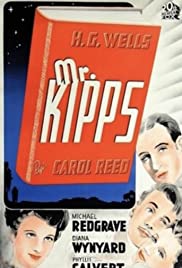
KIPPS
UK, 1941, 111 minutes, Black and white.
Michael Redgrave, Phyllis Calvert, Diana Wynyard, Michael Wilding, Max Adrian, Edward Rigby, Hermione Baddeley.
Directed by Carol Reed.
Kipps is an adaptation of the H.G. Wells novel. It is an early film directed by Carol Reed who was to go on to great success especially in the late forties with Odd Man Out and The Third Man. Director of many interesting films, he was to win an Oscar for Oliver in 1968.
Critically, his earlier films are far more interesting than his later ones. Michael Redgrave has an interesting interpretation of the young Kipps and Phyllis Calvert is quite charming as Anne. There in a good supporting cast including Max Adrian. The presentation in quits elegant and shove the bent of British production values. The musical adaptation, Half a Sixpence, was filmed with Tommy Steele in the central role as a lavish British musical in 1967.
1. Audience interest in H.G. Wells's stories? His popularity especially in the thirties and forties? His background of science fiction, tables? His declaration that this was the story of a simple soul?
2. The work of Carol Reed? Interpretation of Kipps by Michael Redgrave? British production values, style and re-creation of the period, black and white photography, musical score? Pacing?
3. The background or poverty and wealth, British class structure at the turn of the century, snobbery? The important theme of being true to oneself irrespective of riches and position? Themes of love and honour? How satisfying an explanation of social themes? Presuppositions in Wells's story about human equality?
4. The childhood setting - the touches with Kipps playing with Sis and Anne? The atmosphere of childhood, simplicity? The indication of themes of boys and girls, love? Anne being Arthur's girl? The importance and symbolism of the half-sixpence? Kipps' home life, relationship with his uncle and aunt? Their inability to have him at home, their sending him away from home for so many years for the apprenticeship? The build-up to his leaving and setting out on the adventure of life? His future pre-determined by his social class and position, possessions? The 19th century values of work, knowing one's place? Anne chasing the carriage with the half-sixpence?
5. The film's attention to Kipps' arrival in the town, the shop? Mr Shadwell and his shop? Kipps around the shop, the
personnel working there and their attitudes towards their work? The editing of the collage of Kipp's jobs and being called here, there and everywhere? The hard work of the apprentice? The living quarters, close quarters with the others and their attitudes towards Shadwell? The passing of time and the training that Kipps received?
6. The device of the changing shop window to indicate fashions and the passing of time, the changing of transport for instance with the cars? Audience response and acceptance of this passing of time?
7. The grown-up Kipps and his life in the shop, being moulded by his apprenticeship? His efficiency at work, his relationship with the ladies? Customers and the women looking at the various materials and delaying the closing of the shop? Mr Shadwell and Kipps' responsibility towards him? The outings with the girls - and the irony of the rain and their going to the lecture?
8. The tone of the lecture and the opportunities for young workers? The patronizing tone taken by the lecturer, his snobbery? The invitation to Kipps to go to the classes, Kipps' ambitions especially with English? The detail of the woodwork classes and his infatuation with Miss Walsingham?
9. The lecturer and his running of the lectures, the classes, his insinuating style, fawning on the Walsinghams? His reappearance when Kipps had his wealth? With the Walsinghams? His fawning presence with them all the time? A symbol of the hypocrisy of position and wealth?
10. How fortunate was Kipps' inheriting the money? The effect on his life and the accident of the encounter with Chitterlow? The return home and the encounter with Anne and her wondering about the sixpence? Seeing his family again? The basic presuppositions of what he should do with his wealth, have things, dress better, car, mix in society, learn manners? The reaction of his old friends when he saw them again? His being isolated and changed by his wealth? But his not having the knowledge and the polish to deal with society?
11. Kipps and his relationship with Helen and with Anne? Representing the two styles of life, two attitudes of love? Anne and her disappointment - and the significance of the walk along the beach, the memory of the sixpence, Anne's later disappointment at Kipps' engagement? Helen and the Walsinghams and Kipps being made to feel at home within this society? Young Walsingham and his using of Kipps' money? Society and manners? Did Helen Walsingham really love him?
12. The character of Chitterlow - the eccentric humorous type, the chatter about the play, the money, the irony of the play being a success and Kipps being saved and being able to build a life with Anne?
13. Why did Kipps announce his engagement to Helen? The reaction of the family? The importance of the party and the society talk, Anne's presence and her being upset as regards the engagement? Kipps coming to his senses and their being married?
14. The big house, the architect and his insistence on what monied people ought to have? Anne's reactions, Kipps' inability to put the architect off? The irony of their clash and the news about the Walsingham swindle? Helen's integrity in trying to let him know gently?
15. Kipps and Anne accepting their fate, building a marriage, and the humorous irony of Chitterlow arriving with the money?
16. What was the moral of this fable of a simple soul? The presentation of English life and traditions and society? The universal themes of sincerity and being true to oneself?